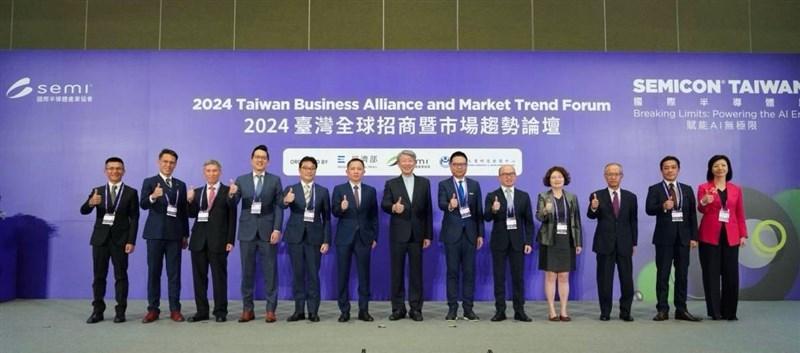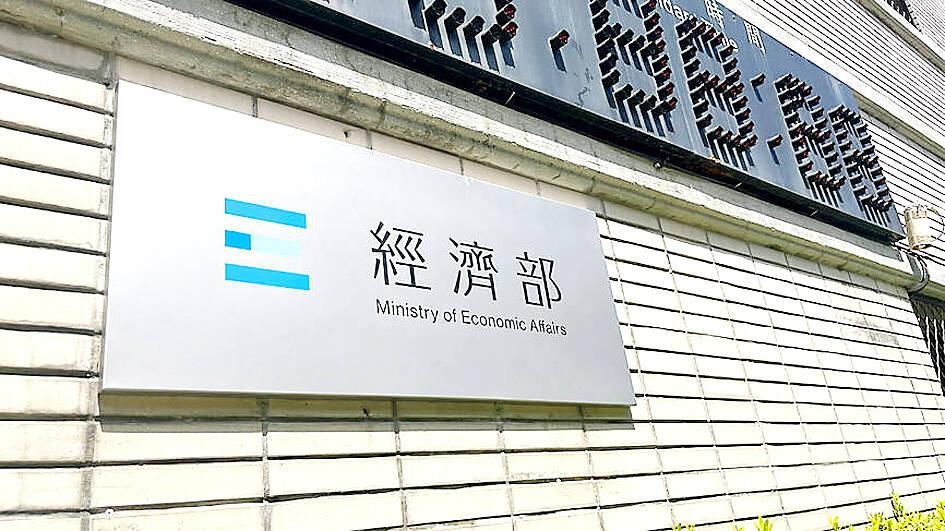Twelve foreign enterprises signed investment letters of intent (LOI) worth an estimated NT$46 billion (US$1.43 billion) at an event held by the Ministry of Economic Affairs (MOEA) at Semicon Taiwan exhibition yesterday.
Of the 12 firms, four are Japanese, three are American, three are European and two are from other regions, the ministry said.
The businesses are engaged in various fields including IC design, IC manufacturing, semiconductor equipment and materials, biotech, real estate and logistics, the ministry said.

Photo courtesy of Ministry of Economic Affairs
The Taiwan Business Alliance Conference, an annual event held by the ministry to attract foreign investors, was held alongside the Semicon Taiwan trade show for the first time this year in the expectation that more foreign enterprises could see the advantage of investing in Taiwan in the boom of artificial intelligence (AI) applications, the ministry said.
Semiconductor-related companies include the US-based Applied Materials Inc and Micron Technology Inc; NXP Semiconductors NV of the Netherlands; Germany's Carl Zeiss Co; as well as Taiwan Fujibo Precision Materials Co (台灣富士紡精密材料), Taiwan Tanaka Kikinzoku Kogyo Co (台灣田中貴金屬) and Central Glass Co from Japan.
Addressing the event, Minister of Economic Affairs J.W. Kuo (郭智輝) said that despite being about the size of the Netherlands and Maryland in the US, Taiwan has "the world's most comprehensive industrial cluster in the semiconductor sector."

Photo: Liao Chia-ning, Taipei Times
This showed Taiwan's "critical position in the supply chain," Kuo added.
Quoting Nvidia Corp chief executive officer Jensen Huang (黃仁勳), Kuo said Taiwan is at the center of the AI revolution.
He added that Nvidia and Advanced Micro Devices Inc's decision to set up research centers in Taiwan represented "a win-win strategy."
A ministry official told the media on the sidelines of the event that the ministry expects investment from the 12 companies to total around NT$46 billion over the next three years.
Asked whether the companies signing LOIs have always invested the pledged amount, the official said this is the case 80 to 90 percent of the time.
Other companies signing the LOI included JRE Business Development Taiwan Inc (台灣捷爾東事業開發) and Switzerland's SHL Medical.

GROWING OWINGS: While Luxembourg and China swapped the top three spots, the US continued to be the largest exposure for Taiwan for the 41st consecutive quarter The US remained the largest debtor nation to Taiwan’s banking sector for the 41st consecutive quarter at the end of September, after local banks’ exposure to the US market rose more than 2 percent from three months earlier, the central bank said. Exposure to the US increased to US$198.896 billion, up US$4.026 billion, or 2.07 percent, from US$194.87 billion in the previous quarter, data released by the central bank showed on Friday. Of the increase, about US$1.4 billion came from banks’ investments in securitized products and interbank loans in the US, while another US$2.6 billion stemmed from trust assets, including mutual funds,

Micron Memory Taiwan Co (台灣美光), a subsidiary of US memorychip maker Micron Technology Inc, has been granted a NT$4.7 billion (US$149.5 million) subsidy under the Ministry of Economic Affairs A+ Corporate Innovation and R&D Enhancement program, the ministry said yesterday. The US memorychip maker’s program aims to back the development of high-performance and high-bandwidth memory chips with a total budget of NT$11.75 billion, the ministry said. Aside from the government funding, Micron is to inject the remaining investment of NT$7.06 billion as the company applied to participate the government’s Global Innovation Partnership Program to deepen technology cooperation, a ministry official told the

Taiwan Semiconductor Manufacturing Co (TSMC, 台積電), the world’s leading advanced chipmaker, officially began volume production of its 2-nanometer chips in the fourth quarter of this year, according to a recent update on the company’s Web site. The low-key announcement confirms that TSMC, the go-to chipmaker for artificial intelligence (AI) hardware providers Nvidia Corp and iPhone maker Apple Inc, met its original roadmap for the next-generation technology. Production is currently centered at Fab 22 in Kaohsiung, utilizing the company’s first-generation nanosheet transistor technology. The new architecture achieves “full-node strides in performance and power consumption,” TSMC said. The company described the 2nm process as

JOINT EFFORTS: MediaTek would partner with Denso to develop custom chips to support the car-part specialist company’s driver-assist systems in an expanding market MediaTek Inc (聯發科), the world’s largest mobile phone chip designer, yesterday said it is working closely with Japan’s Denso Corp to build a custom automotive system-on-chip (SoC) solution tailored for advanced driver-assistance systems and cockpit systems, adding another customer to its new application-specific IC (ASIC) business. This effort merges Denso’s automotive-grade safety expertise and deep vehicle integration with MediaTek’s technologies cultivated through the development of Media- Tek’s Dimensity AX, leveraging efficient, high-performance SoCs and artificial intelligence (AI) capabilities to offer a scalable, production-ready platform for next-generation driver assistance, the company said in a statement yesterday. “Through this collaboration, we are bringing two